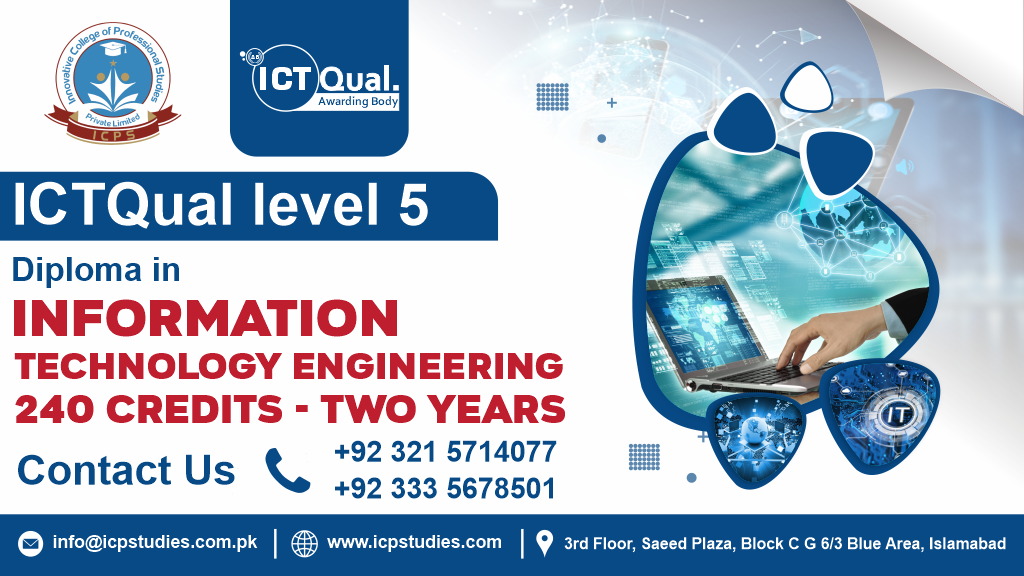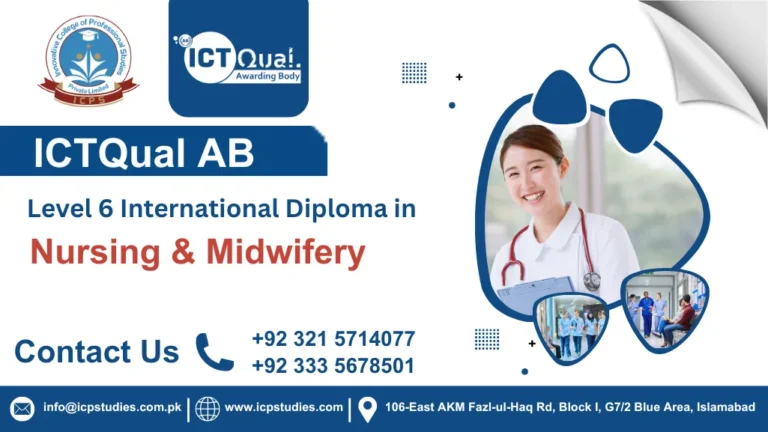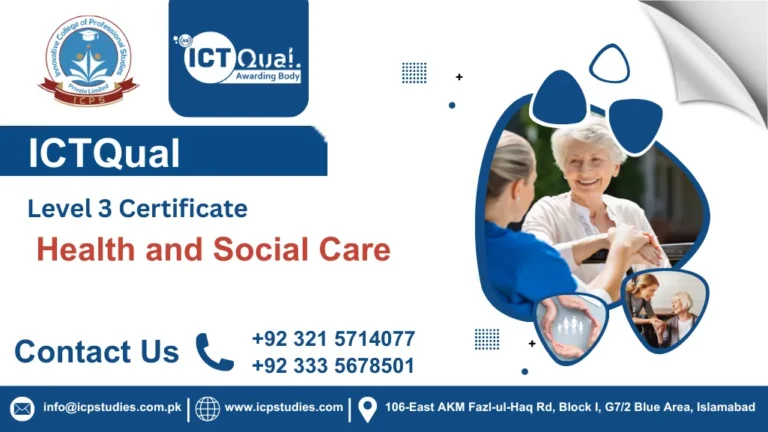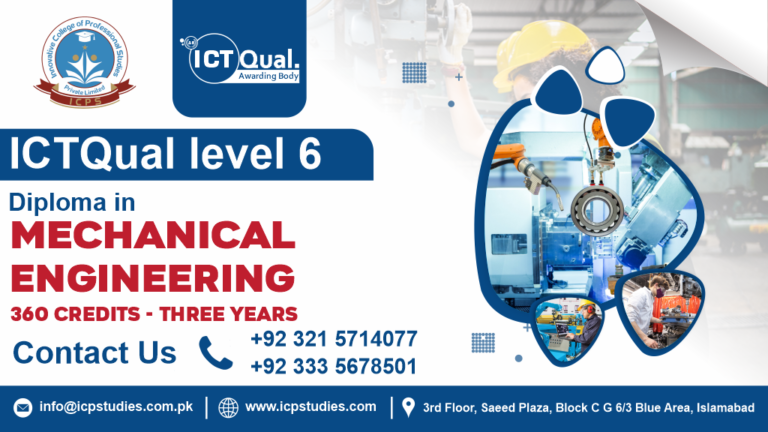In today’s rapidly evolving technological world, a strong foundation in IT engineering is essential for anyone looking to pursue a career in the tech industry. The ICTQual Level 5 Diploma in Information Technology Engineering (240 Credits – Two Years) offers an excellent opportunity for individuals to gain practical and theoretical knowledge in key IT engineering disciplines. This two-year course is designed to prepare students for a wide range of roles in the IT industry, including network engineering, systems analysis, and software development.
The ICTQual Level 5 Diploma in Information Technology Engineering is a comprehensive program that provides students with an in-depth understanding of core IT concepts, such as computer systems, software development, networking, cybersecurity, and IT project management. With 240 credits over two years, the course combines theoretical learning with hands-on practical experience, making it an ideal choice for aspiring IT professionals.
This qualification is equivalent to the second year of a bachelor’s degree and is recognized globally, making it a valuable credential for those looking to advance their careers or pursue further studies in IT.
The ICTQual Level 5 Diploma in Information Technology Engineering (240 Credits – Two Years) offers an outstanding opportunity to develop the skills and knowledge needed to succeed in the dynamic field of IT engineering. With its comprehensive curriculum, practical focus, and global recognition, this course will equip you to take on a variety of IT roles in today’s technology-driven world. Whether you’re just starting out or looking to build on your existing knowledge, this diploma is the perfect choice for aspiring IT professionals.
Start your journey today and unlock the many career opportunities that await in the IT engineering field!
All About ICTQual Level 5 Diploma in Information Technology Engineering 240 Credits – Two Years
Course Overview
The ICTQual Level 5 Diploma in Information Technology Engineering (240 Credits – Two Years) is an advanced qualification designed to provide students with a comprehensive understanding of the essential concepts and practical skills needed in the ever-evolving field of IT engineering. This two-year course offers a well-rounded curriculum that combines both theoretical knowledge and hands-on experience in areas such as computer systems, software development, networking, cybersecurity, and IT project management.
The diploma is equivalent to the second year of a bachelor’s degree, offering a pathway to higher education or professional advancement. Upon completion, students will be equipped to tackle complex IT challenges and thrive in roles such as network administrators, software engineers, and IT project managers.
With a focus on real-world applications and industry-relevant skills, the ICTQual Level 5 Diploma is perfect for individuals looking to gain a solid foundation in IT engineering, advance their careers, or pursue further academic qualifications. Whether you’re new to IT or looking to deepen your expertise, this course provides the tools and knowledge necessary to succeed in the dynamic IT industry.
Study Units
- Year 1 (120 Credits)
- Principles of Information Technology Engineering
- Computer Hardware and Architecture
- Networking Fundamentals
- Operating Systems and Software Applications
- Database Management Systems
- Web Technologies and Development
- Programming and Software Development
- Data Communication and Networking
- IT Project Management
- Cybersecurity Fundamentals
- System Analysis and Design
- Introduction to Cloud Computing
- Year 2 (120 Credits)
- Advanced Networking Technologies
- IT Systems Integration
- Data Structures and Algorithms
- IT Governance and Risk Management
- Mobile Application Development
- Software Engineering and Testing
- Advanced Database Management
- Artificial Intelligence and Machine Learning
- Enterprise Resource Planning (ERP) Systems
- IT Infrastructure Management
- E-Commerce Systems and Security
- Final Year Project and Professional Practice
To enroll in the ICTQual Level 5 Diploma in Information Technology Engineering (240 Credits – Two Years), applicants must meet the following entry requirements:
- Educational Qualifications:
- A minimum of Level 4 qualification in Information Technology, Computer Science, or a related field (e.g., a Higher National Certificate, or equivalent).
- Alternatively, applicants with other relevant qualifications, such as a secondary school diploma with strong results in mathematics and science subjects, may also be considered on a case-by-case basis.
- Basic IT Proficiency:
- A foundational understanding of basic IT concepts and proficiency in using computers and software applications. This can be demonstrated through previous academic work, certifications, or relevant work experience.
- Mathematics and Problem-Solving Skills:
- A solid grasp of mathematics (ideally up to at least GCSE or equivalent) is essential for success in programming, networking, and database-related units of the course. Applicants should be comfortable with basic algebra and logic.
- English Language Proficiency:
- For non-native English speakers, proof of English language proficiency (e.g., IELTS score of 6.0 or equivalent) is required to ensure students can understand and communicate technical concepts effectively.
- Work Experience (Optional):
- While not mandatory, any relevant work experience or internships in IT, software development, or related fields will be considered an advantage during the application process.
If you meet these requirements, you are well-positioned to pursue this diploma and gain the skills needed to advance your career in IT engineering.
The ICTQual Level 5 Diploma in Information Technology Engineering (240 Credits – Two Years) is designed for individuals who are passionate about technology and looking to build or enhance their careers in IT engineering. This course is ideal for:
- Aspiring IT Professionals:
- Individuals looking to start or advance their careers in IT engineering, with a focus on computer systems, networking, software development, and cybersecurity.
- Current IT Technicians or Administrators:
- IT professionals already working in technical roles who want to formalize their skills, expand their knowledge, and move into more advanced IT engineering positions.
- Graduates of Level 4 Qualifications:
- Students who have completed a Level 4 qualification in IT, such as a Higher National Certificate (HNC) or equivalent, and want to build on their knowledge to achieve a more advanced qualification.
- Career Changers:
- Individuals looking to transition into IT from other fields, with a background in areas such as engineering, science, or mathematics, who are eager to develop technical IT skills.
- Those Interested in Software Development and Networking:
- People with an interest in software development, networking, or cybersecurity who wish to gain in-depth knowledge and practical skills in these areas.
- Entrepreneurs and IT Innovators:
- Those interested in starting their own IT-focused business or working in technology startups, with a desire to acquire a broad understanding of IT systems, software, and infrastructure.
- Students Pursuing Further Education:
- Individuals who wish to continue their studies after completing the diploma, with the goal of pursuing a bachelor’s degree or other advanced qualifications in IT, computer science, or engineering.
This course is for anyone who is determined to build a successful career in IT engineering by gaining the technical expertise and professional knowledge required to thrive in this fast-paced and ever-evolving field. Whether you’re looking to start fresh, advance in your current career, or specialize in specific IT areas, the ICTQual Level 5 Diploma provides the skills needed to succeed.
Learning Outcomes
Year 1 (120 Credits)
Semester 1
- Fundamentals of Information Technology
- Gain a comprehensive understanding of the evolution of IT and its significance in modern industries.
- Identify and describe the core components of IT infrastructure and systems.
- Computer Hardware and Architecture
- Explain the key components of computer hardware such as processors, memory, and storage devices.
- Analyze how computer systems are structured and the interaction between hardware and software.
- Operating Systems and System Software
- Understand the role of operating systems in managing system resources.
- Demonstrate knowledge of system software, including file management, device management, and system security.
- Networking Fundamentals
- Define basic networking concepts, such as protocols, network topologies, and communication models.
- Understand the components of network infrastructures including routers, switches, and cables.
- Software Development Fundamentals
- Develop foundational programming skills using a high-level programming language.
- Understand core software development principles, such as algorithm design and problem-solving techniques.
- Mathematics for IT Engineering
- Apply mathematical techniques such as algebra, logic, and basic calculus to solve IT engineering problems.
- Use mathematical modeling and reasoning to address real-world IT challenges.
- Database Management Systems
- Understand the principles of database management systems (DBMS) and their role in data storage and retrieval.
- Use SQL to perform basic database queries and manipulate data.
- Introduction to IT Security
- Identify common IT security threats and vulnerabilities.
- Understand basic security measures like encryption, authentication, and firewalls.
- Project Management for IT
- Apply fundamental project management principles, such as planning, resource allocation, and scheduling.
- Gain knowledge of IT project management methodologies like Agile and Waterfall.
- Professional Development in IT Engineering
- Develop essential professional skills including communication, teamwork, and time management.
- Understand the ethical considerations and professional responsibilities of IT engineers.
Year 2 (120 Credits)
Semester 2
- Advanced Networking and Network Protocols
- Analyze advanced networking concepts, including routing, switching, and IP addressing.
- Understand and implement network protocols such as TCP/IP, DNS, and DHCP.
- Systems Analysis and Design
- Apply methodologies such as UML to analyze and design complex IT systems.
- Develop system requirements and specifications for both software and hardware solutions.
- Software Development and Object-Oriented Programming
- Apply object-oriented programming (OOP) principles to software development.
- Develop and debug software applications using advanced programming techniques.
- Cloud Computing Fundamentals
- Understand cloud computing architectures, deployment models, and services like IaaS, PaaS, and SaaS.
- Apply cloud computing solutions for scalable and cost-efficient IT services.
- Database Administration and Optimization
- Perform database administration tasks including backup, recovery, and performance tuning.
- Optimize database queries and manage large-scale databases efficiently.
- Cybersecurity Essentials
- Implement basic cybersecurity measures to protect IT systems and data from cyber threats.
- Understand risk management, threat detection, and prevention strategies.
- IT Infrastructure and Systems Management
- Design, deploy, and manage IT infrastructure components such as servers, storage, and networks.
- Develop strategies for efficient systems management, including monitoring and troubleshooting.
- Mobile Application Development
- Develop mobile applications for platforms like Android and iOS using development frameworks.
- Apply UI/UX design principles to create user-friendly mobile applications.
- Web Development Basics
- Create dynamic, responsive websites using HTML, CSS, and JavaScript.
- Understand both front-end and back-end web development techniques.
- Advanced IT Support and Troubleshooting
- Use diagnostic tools to troubleshoot complex IT issues in hardware, software, and networks.
- Provide effective IT support in diverse environments, including remote and on-site troubleshooting.
Semester 3
- Advanced IT Security and Ethical Hacking
- Implement ethical hacking techniques to identify vulnerabilities in IT systems.
- Understand the legal and ethical considerations involved in penetration testing and cybersecurity.
- Advanced Database Technologies
- Work with advanced database systems such as NoSQL and manage large datasets.
- Understand database scaling techniques like sharding and replication.
- Cloud Security and Virtualization
- Apply cloud security best practices to safeguard cloud infrastructures and applications.
- Implement virtualization technologies for more efficient resource management.
- Capstone Project
- Synthesize knowledge from all prior units to design and develop a comprehensive IT solution or system.
- Present and defend the final project, showcasing practical problem-solving, project management, and technical skills in IT engineering.
These learning outcomes are designed to equip students with the knowledge and skills necessary for a successful career in IT engineering, preparing them to tackle complex technical challenges and excel in the ever-evolving tech industry.
FAQs about ICTQual Level 5 Diploma in Information Technology Engineering 240 Credits – Two Years







